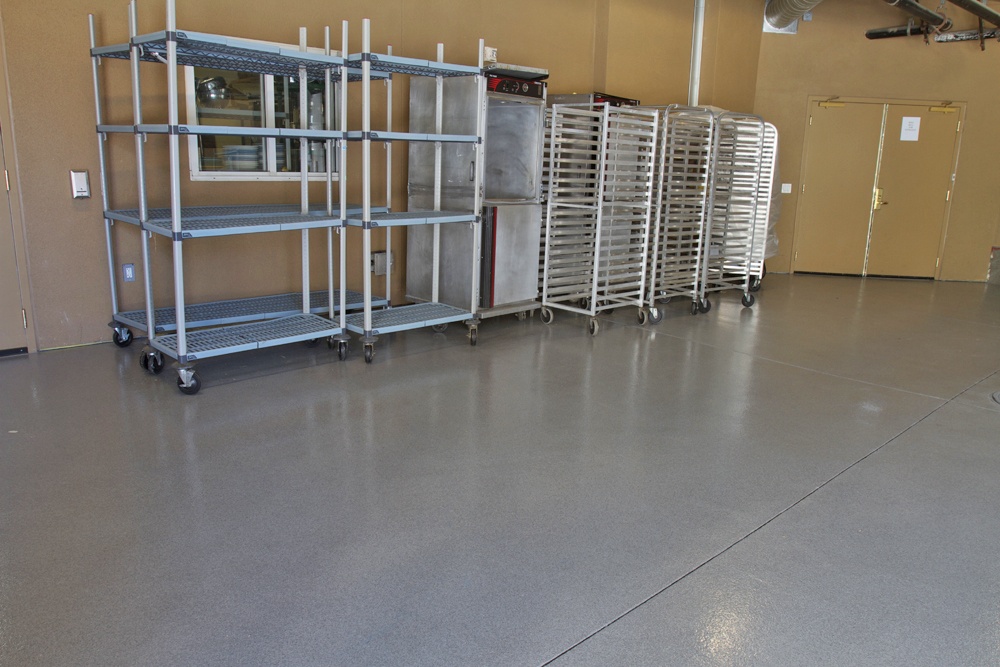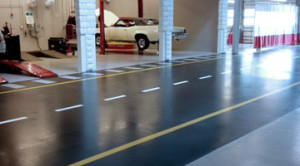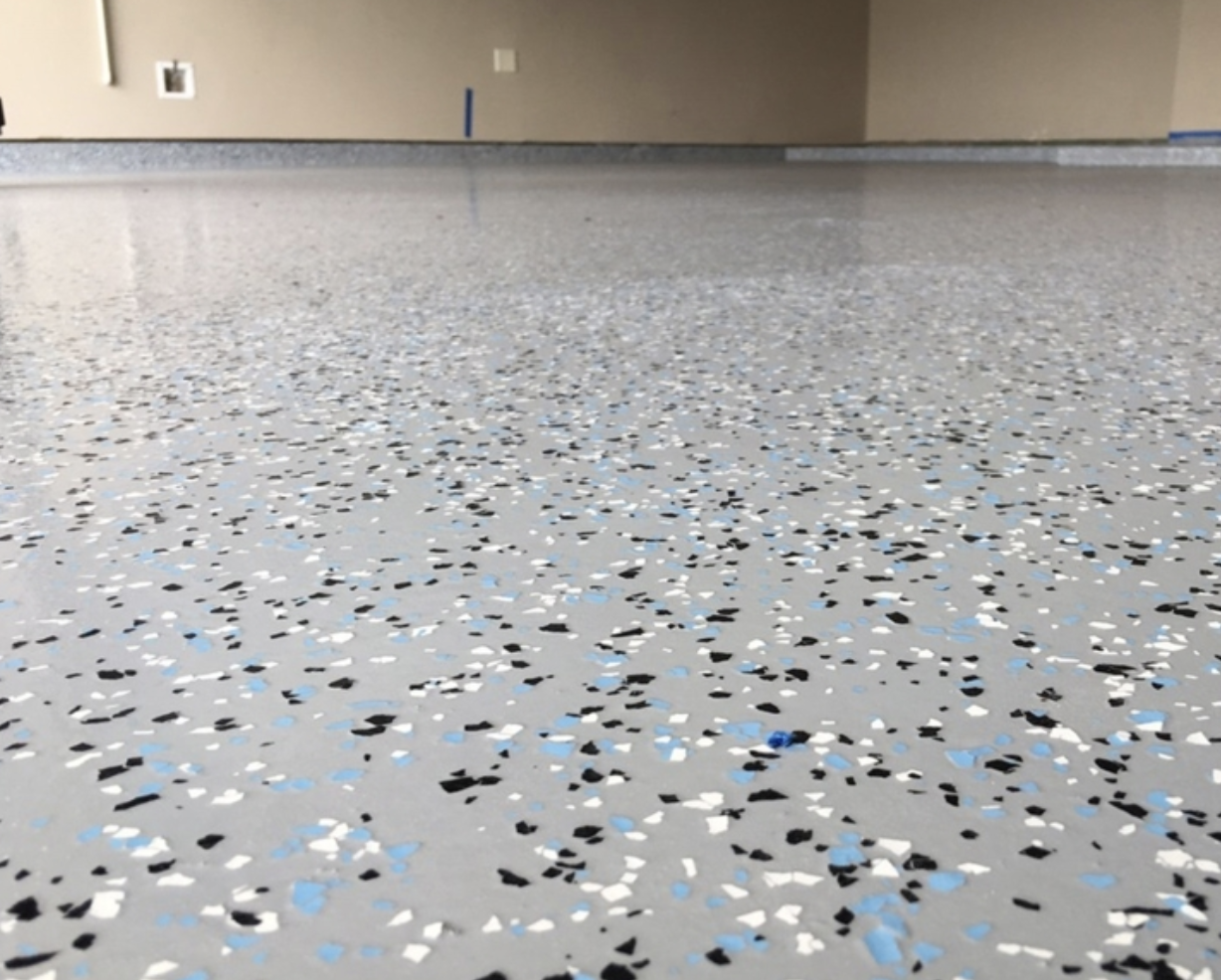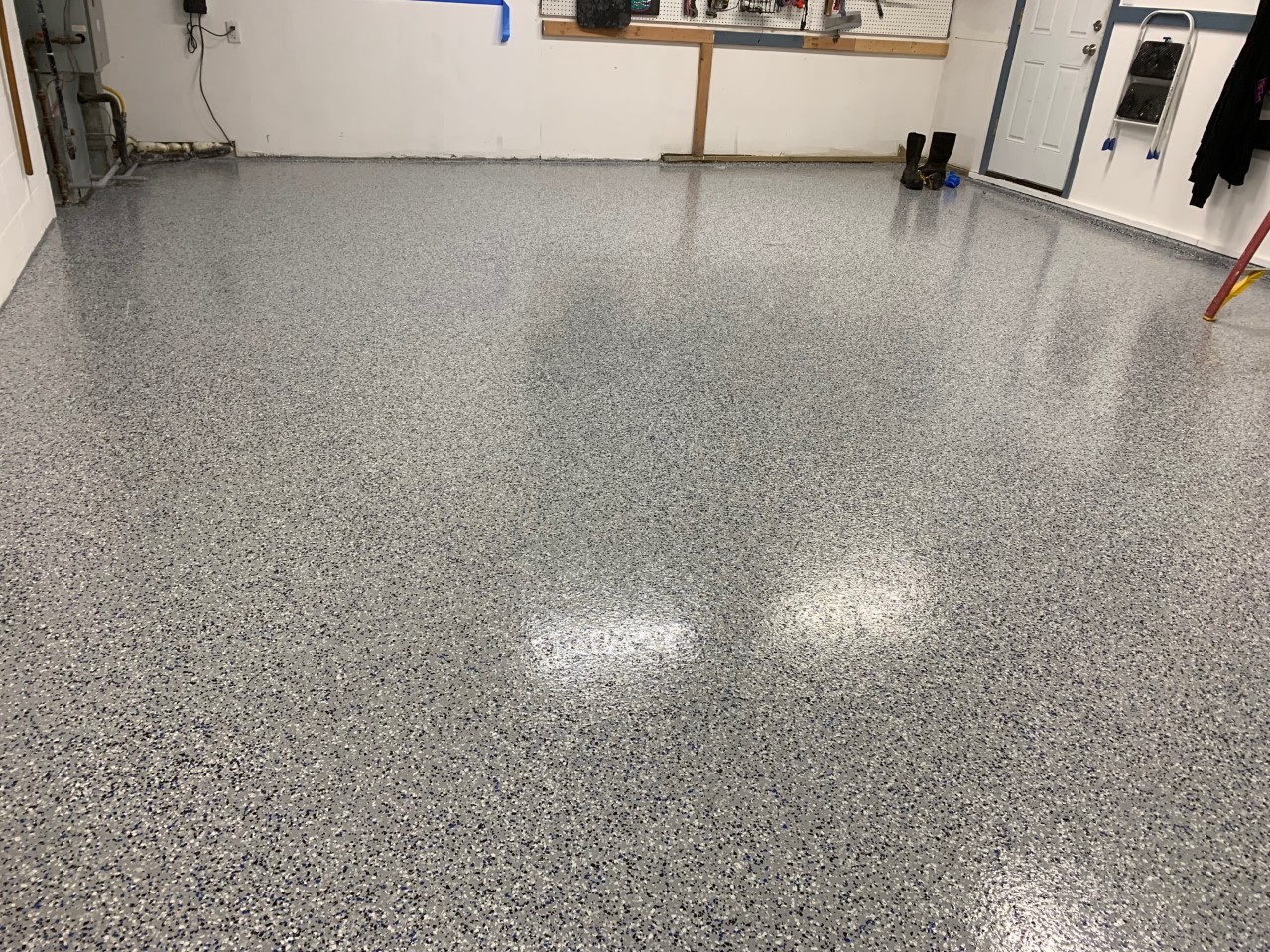Types of Heavy-Duty Garage Floor Coatings
When it comes to heavy-duty garage floor coatings, there are several types to consider. Each type has its own set of properties that make it suitable for different applications and preferences. The most common types include epoxy, polyurethane, polyurea, and acrylic coatings.
Epoxy Coatings
Epoxy coatings are among the most popular choices for garage floors due to their durability and aesthetic appeal. Epoxy is a thermosetting resin that forms a tough, thick coating when mixed with a hardener. This type of coating is known for its high resistance to chemicals, abrasion, and impact, making it ideal for heavy use environments like garages. Additionally, epoxy coatings come in a variety of colors and finishes, allowing for customization to match your garage’s decor.
Polyurethane Coatings
Polyurethane coatings are another excellent option, offering even greater flexibility and chemical resistance than epoxy. These coatings are particularly effective at resisting UV rays, which prevents yellowing over time. Polyurethane is also more resistant to scratches and can handle thermal expansion and contraction better than epoxy, making it a suitable choice for garages exposed to varying temperatures.
Polyurea Coatings
Polyurea coatings are known for their extremely fast curing times and incredible durability. This type of coating can be applied in a wide range of temperatures and is highly resistant to chemicals and abrasions. Polyurea is also flexible, allowing it to withstand movements in the underlying concrete without cracking. Its quick curing time means that a garage can be back in use within a day or two of application.
Acrylic Coatings
Acrylic coatings, while not as durable as epoxy, polyurethane, or polyurea, offer a budget-friendly option for garage floor protection. These coatings are easy to apply and provide decent protection against stains and minor abrasions. Acrylic coatings are also available in a variety of colors and finishes, offering some level of customization.
Hybrid Systems
Hybrid systems combine the benefits of different types of coatings to provide superior performance. For example, an epoxy base coat can be topped with a polyurethane or polyurea topcoat to leverage the strengths of each material. These hybrid systems are often used in professional installations to achieve the best balance of durability, chemical resistance, and aesthetic appeal.

Preparation and Application Process
Proper preparation and application are crucial to the success and longevity of heavy duty garage floor coatings. Skipping or rushing through these steps can lead to poor adhesion, bubbling, and premature failure of the coating. Here, we will outline the key steps involved in preparing and applying a garage floor coating.
Surface Preparation
The first and most important step in the coating process is surface preparation. This involves cleaning the floor thoroughly to remove any dirt, oil, grease, or existing coatings that could interfere with adhesion. Pressure washing, degreasers, and concrete cleaners are commonly used tools and products for this stage. Any cracks or imperfections in the concrete should be repaired with a suitable patching compound.
Grinding or Etching
After cleaning, the concrete surface must be roughened to create a profile that the coating can adhere to. This can be achieved through mechanical grinding or acid etching. Grinding involves using a concrete grinder to create a textured surface, while acid etching uses a chemical solution to achieve the same effect. Both methods are effective, but grinding is generally preferred for its consistency and control.
Priming
Priming the floor is an optional but recommended step, especially for porous or previously uncoated concrete. A primer helps to seal the surface, providing a better bond for the topcoat and reducing the likelihood of bubbles and delamination. Primers are typically applied with a roller and allowed to dry completely before moving on to the next step.
Mixing and Applying the Coating
Once the surface is prepared and primed, the coating can be mixed and applied. It is crucial to follow the manufacturer’s instructions for mixing ratios and application techniques. Epoxy and polyurethane coatings often come in two parts that must be mixed thoroughly. The coating is then applied using rollers or brushes, starting from the farthest corner and working towards the exit to avoid stepping on the freshly coated surface.
Curing
Proper curing is essential for the coating to achieve its full strength and durability. Curing times can vary depending on the type of coating and environmental conditions. It is important to avoid using the garage or exposing the floor to water, chemicals, or heavy traffic during the curing period. Some coatings, like polyurea, cure very quickly, while others, like epoxy, may take several days to fully cure.
Applying a Topcoat
For additional protection and enhanced appearance, a topcoat can be applied over the base coat. This is especially common with hybrid systems. The topcoat provides extra durability, UV resistance, and a glossy or matte finish, depending on the desired look. Like the base coat, the topcoat must be allowed to cure completely before the garage is put back into use.
Benefits of Heavy Duty Garage Floor Coatings
Investing in a heavy duty garage floor coating offers numerous benefits that go beyond simple protection. These benefits can enhance the functionality, safety, and aesthetics of your garage, making it a more enjoyable and practical space.
Enhanced Durability
One of the primary benefits of heavy duty garage floor coatings is the enhanced durability they provide. These coatings protect the concrete from impacts, abrasions, and heavy loads, extending the life of the floor. This is particularly important in garages that see a lot of use, whether from vehicles, heavy tools, or frequent foot traffic.
Chemical Resistance
Garages are often exposed to various chemicals, including motor oil, gasoline, antifreeze, and cleaning solvents. Heavy-duty coatings, particularly epoxy and polyurethane, offer excellent resistance to these chemicals, preventing stains and damage. This resistance makes cleaning spills easier and reduces the risk of long-term damage to the concrete.
Improved Safety
Safety is another significant benefit of garage floor coatings. Coated floors can be made slip-resistant, reducing the risk of accidents, especially in wet or oily conditions. Additionally, coatings can seal the concrete, reducing dust that can contribute to respiratory issues and making the garage a cleaner environment overall.
Aesthetic Appeal
A well-coated garage floor can transform the look of the space, making it more inviting and visually appealing. Coatings are available in a wide range of colors and finishes, including metallic and decorative flakes, allowing for customization to suit personal preferences and styles. This can make the garage a more pleasant place to work and spend time.
Easier Maintenance
Maintaining a coated garage floor is significantly easier than maintaining bare concrete. The smooth, sealed surface of the coating resists stains and is easier to clean with simple sweeping and mopping. This reduced maintenance effort saves time and money in the long run and keeps the garage looking clean and tidy.
Increased Property Value
Finally, a well-maintained and aesthetically pleasing garage floor can increase the overall value of your property. Prospective buyers often appreciate the added durability and visual appeal of a coated garage floor, making it a worthwhile investment if you plan to sell your home in the future. A quality garage floor coating can be a selling point that sets your property apart from others.
Common Mistakes to Avoid
While heavy duty garage floor coatings offer numerous benefits, there are several common mistakes that can compromise their effectiveness. Avoiding these pitfalls will help ensure that your floor coating performs well and lasts for many years.
Inadequate Surface Preparation
Skipping or inadequately performing surface preparation is one of the most common mistakes. A poorly prepared surface can lead to poor adhesion, resulting in peeling and bubbling of the coating. Always ensure the floor is thoroughly cleaned, repaired, and properly textured before applying the coating.
Ignoring Moisture Issues
Moisture in the concrete can cause the coating to fail. It is essential to test for moisture and address any issues before applying the coating. Moisture barriers or vapor barriers can be used to prevent moisture from seeping through the concrete and affecting the coating.
Using Low-Quality Products
Opting for low-quality coatings to save money can backfire. Cheap products may not provide the same level of durability, chemical resistance, or aesthetic appeal as higher-quality options. Investing in a reputable, high-quality product will ensure better performance and longevity.
Incorrect Mixing Ratios
For coatings that require mixing, such as epoxy and polyurethane, incorrect mixing ratios can lead to improper curing and reduced durability. Always follow the manufacturer’s instructions precisely when mixing the components to ensure the coating cures correctly and achieves its intended strength.
Applying Too Thick or Too Thin
Applying the coating too thickly or too thinly can both cause issues. A thick coat may not cure properly and can lead to bubbles and uneven surfaces. A thin coat may not provide adequate protection and can wear out quickly. It’s important to apply the coating evenly and according to the recommended thickness.
Insufficient Curing Time
Rushing the curing process can compromise the coating’s durability. Ensure that the coating is allowed to cure for the recommended time before subjecting it to heavy traffic or chemical exposure. This patience will pay off in the long run by ensuring the coating’s full strength and longevity.
What are the best types of coatings for a heavily used garage?
The best types of coatings for a heavily used garage are typically epoxy, polyurethane, and polyurea. Epoxy coatings are known for their durability and chemical resistance, making them ideal for heavy use. Polyurethane coatings offer greater flexibility and UV resistance, which helps prevent yellowing and scratching. Polyurea coatings are extremely durable and cure quickly, making them suitable for garages that need to be back in use rapidly. Each of these coatings has its own advantages, so the choice depends on specific needs and preferences.
How do I prepare my garage floor for coating?
Preparing your garage floor for coating involves several crucial steps. First, thoroughly clean the floor to remove all dirt, grease, and debris. Use a degreaser for any oil stains. Next, repair any cracks or imperfections in the concrete with a suitable patching compound. After cleaning and repairing, roughen the surface by grinding or acid etching to create a profile for the coating to adhere to. Finally, consider applying a primer to seal the surface and improve adhesion before applying the topcoat.
Can I apply garage floor coating myself, or should I hire a professional?
While it is possible to apply garage floor coating yourself, hiring a professional is often recommended for the best results. Professional installers have the experience and equipment to properly prepare the surface and apply the coating evenly. They can also handle any unexpected issues that arise during the process. If you choose to do it yourself, be sure to follow all manufacturer instructions carefully and take your time with each step to ensure a quality finish.
How long does a garage floor coating last?
The longevity of a garage floor coating depends on the type of coating used, the quality of the application, and the level of use and maintenance. High-quality epoxy, polyurethane, and polyurea coatings can last anywhere from 10 to 20 years or more with proper care. Regular maintenance, such as cleaning spills promptly and avoiding dragging heavy objects across the floor, can help extend the life of the coating. Periodic reapplication of a topcoat can also help maintain the floor’s appearance and durability.
Are garage floor coatings resistant to all chemicals?
While garage floor coatings, particularly epoxy and polyurethane, are highly resistant to many chemicals, they are not completely impervious to all substances. They offer excellent protection against common garage chemicals like motor oil, gasoline, antifreeze, and household cleaners. However, some harsh chemicals, such as strong acids or solvents, can still damage the coating over time. It’s important to clean up spills promptly and avoid prolonged exposure to harsh chemicals to maintain the integrity of the coating.
How much does it cost to coat a garage floor?
The cost of coating a garage floor varies depending on the size of the garage, the type of coating used, and whether you hire a professional or do it yourself. For a professional installation, you can expect to pay between $3 to $12 per square foot, including materials and labor. DIY kits for epoxy coatings typically cost between $50 to $150 per kit, which covers about 250 square feet. While DIY is more affordable, professional installation offers the advantage of a higher quality finish and longer-lasting results.
I/O INDOOR/OUTDOOR LOW VOC WATER BASED EPOXY
ArmorClad Garage Floor Epoxy Best Garage Floor Epoxy Kit
China Heavy Duty Garage Floor Epoxy Paint Garage Floor Painting
Garage – Westcoat Specialty Coating Systems
Related Posts:






